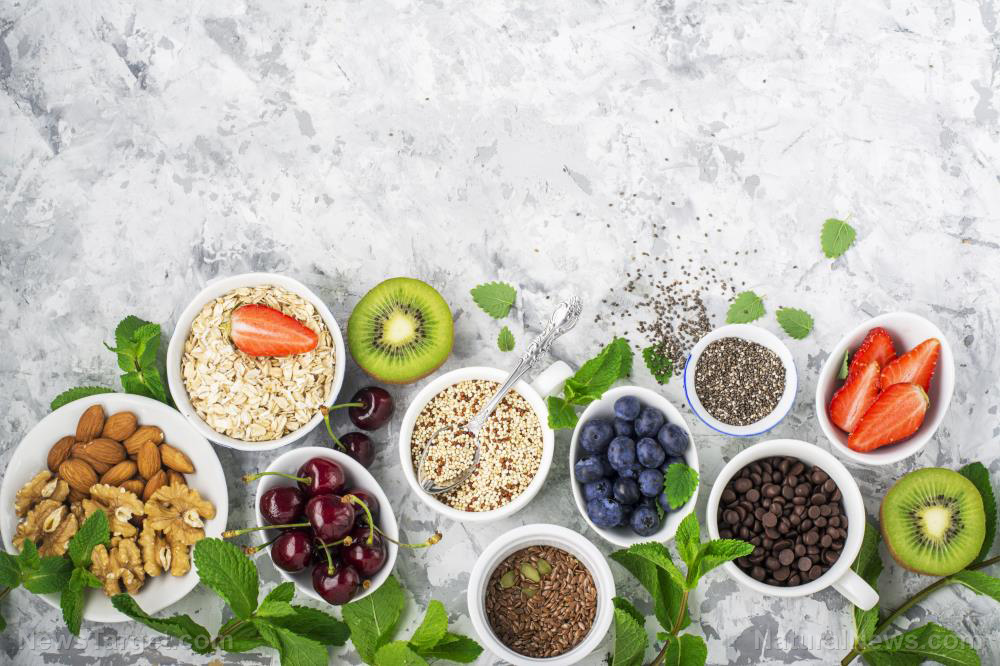Protein, water and more: 9 Ways to boost your metabolism and promote weight loss
08/10/2022 / By Zoey Sky

Metabolism refers to the chemical reactions going on in your body that keep it alive and functioning properly. It is the process by which your body converts what you eat and drink into energy.
Certain proteins in your body control these chemical reactions. But don’t confuse metabolism with metabolic rate, which refers to the amount of calories that you burn. If you have a high metabolism, you burn more calories and experience faster weight loss.
Try the suggestions below if you want to boost your metabolism and lose weight naturally.
Drink water instead of sugary beverages
There’s no denying that sugary beverages are bad for your health. They contain little to no nutrients and they can make you gain weight. If you love soda, you will have to make the switch to plain water if you really want to lose weight.
According to Harvard Health, people who drink water instead of sugary beverages are more likely to lose weight and maintain a healthy weight.
Sugary drinks contain calories that add up throughout the day. On the other hand, water helps you stay hydrated without increasing your calorie intake.
If giving up soda is too hard, make a small change like replacing at least one to three cups of soda with plain water. Do this regularly and you will notice significant improvements.
As a bonus, water is satiating so you may feel full longer, which can help curb cravings for junk food.
Drink coffee
A study published in The American Journal of Clinical Nutrition shows that moderate caffeine intake can increase energy expenditure. It helps boost resting metabolic rate by three to 11 percent for lean and post-obese individuals.
Note that this effect can taper off with age and is more effective in younger adults.
In a different study published in The Journal of American Physiology, Endocrinology and Metabolism, researchers reported that caffeine can boost fat burning by at least 29 percent in lean women and 10 percent in obese women.
Cook with coconut oil
Many cooking oils contain saturated and long-chain fats. Replacing them with coconut oil may offer benefits because the latter is full of medium-chain fats.
A recent study published in the journal Food and Function suggests that medium-chain fats can boost your metabolism and promote weight loss. They can also help reduce obesity-related risk factors.
Eat more protein
When you eat, your metabolism responds. The thermic effect of food (TEF) refers to the increase of calories needed to process the nutrients of a meal that you’ve eaten.
Protein causes a larger rise in TEF — about 20 to 35 percent — than carbohydrates; this also increases your metabolic rate. Consuming healthy foods full of protein can also keep you feeling full longer.
Eat spicy foods
Findings of a 2017 study published in the International Journal of Food Science and Nutrition showed that chili peppers can improve insulin control, which helps with weight management.
Chili decreases energy expenditure by activating brown adipose tissue. The study authors noted that chili consumption could help with health issues like diabetes, cardiovascular disorders and obesity.
Peppers also contain capsaicin, which helps boost metabolism. According to The McCormick Science Institute, red pepper can increase satiety and boost metabolism and energy.
Lift weights
Fat is less metabolically active than muscle. This means your metabolism will decrease when you are losing weight and when you are sedentary.
Fortunately, lifting weights can help counteract this drop and build muscle.
Harvard Health reported that resting energy expenditure makes up about 60 to 75 percent of the calories you burn daily. This is also the rate at which you burn calories after exercising.
If you’re too busy to go to the gym, you can still “lift weights” by doing chores like rearranging your closet or pantry. In fact, the calories you burn doing household chores can help prevent stay-at-home weight gain.
Stand more frequently
Sitting is often called “the new smoking” since both habits are associated with higher rates of obesity, increased blood pressure and other chronic disease risk factors. Sitting for too long can also have negative side effects on your mental health.
Harvard Health reported that standing burns eight more calories per hour than sitting, and walking burns even more calories. If you’re too busy, set an alarm on your phone and stand up and stretch or walk every 40 minutes. Alternatively, you can get an under-desk bike or treadmill desk to keep your legs moving.
You can also get a standing desk. Even though standing doesn’t burn many calories, variations between sitting and standing throughout the day are better for your overall well-being.
Try high-intensity interval training (HIIT)
If your health condition allows, try high-intensity interval training (HIIT). HIIT engages your body in intense and quick bursts of aerobic and resistance workouts.
A systematic review published in the journal Obesity Reviews revealed that the variety in activity at quick and intense levels can help burn fat by boosting your metabolic rate for hours after exercising.
A HIIT workout can last ten to 30 minutes. Tailor your routine by including different activities like biking, dancing, jumping rope or sprinting at a fast and intense rate for 30 seconds. Follow this by exercising for several minutes at a slower, more relaxed pace.
The number of reps can range from four to six. Including HIIT workouts in your exercise routine may also help you avoid weight plateauing.
Get enough sleep
Good sleep habits are also crucial for a healthy weight. Lack of sleep can influence insulin resistance along with your blood sugar.
Researchers from Pennsylvania State University discovered that sleep deprivation can negatively affect your metabolism and cause weight gain. Additionally, longer exposure to short sleep periods can increase your risk for obesity and other chronic conditions. Not getting enough sleep for many days can also affect your metabolism.
Because it takes time for your system to return to its baseline metabolic rate, you can’t fix the issue by catching up on sleep over the weekend. For best results, improve your sleeping habits and try to get at least seven to nine hours of sleep, the recommended amount of sleep for adults.
Improve your lifestyle habits to naturally boost your metabolism. Exercise regularly, drink more water and eat protein-rich foods to boost your metabolism and promote weight loss.
Watch the video below to know how detoxifying your liver can help speed up your metabolism.
This video is from the Natural News channel on Brighteon.com.
More related stories:
Even if you’re slim, cutting down on calories can improve overall health.
Intermittent fasting 101: How many hours do you have to fast to reap its benefits?
12 reasons why you should have cinnamon in your kitchen cupboard.
Sources:
Submit a correction >>
Tagged Under:
This article may contain statements that reflect the opinion of the author
RECENT NEWS & ARTICLES
COPYRIGHT © 2017 SUPER FOODS NEWS




















